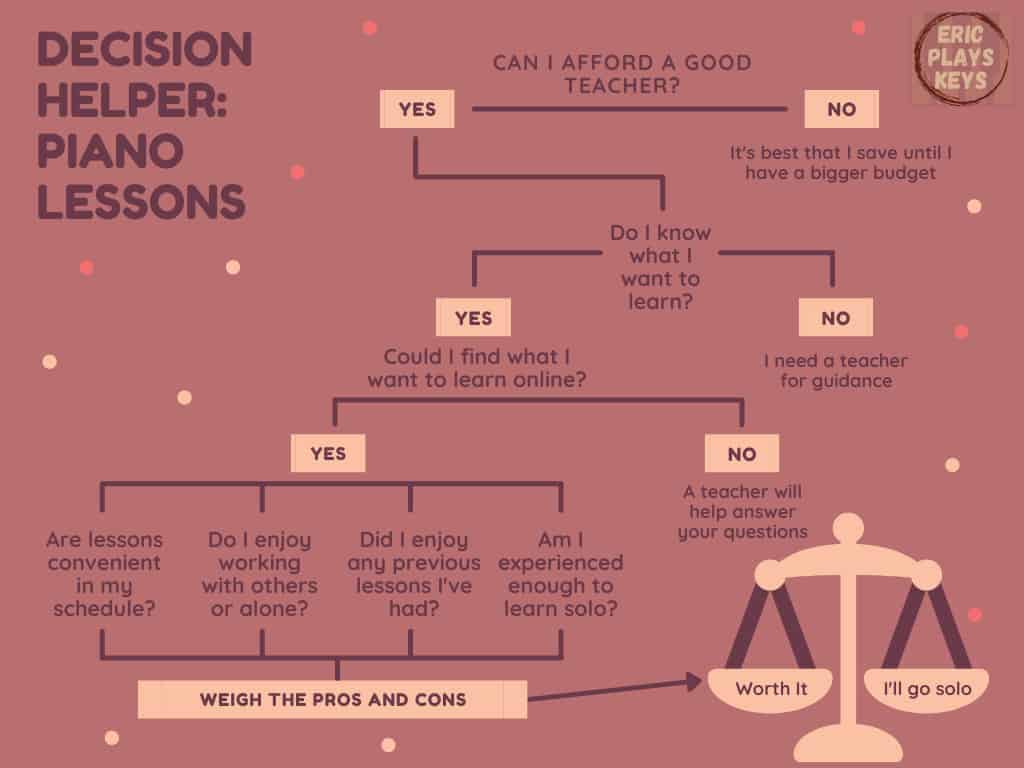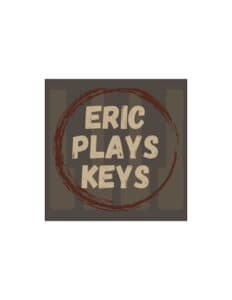It’s not easy learning to play an instrument, whether you have lessons or not. I’ve spent years taking lessons, years without, and even spent some time as a teacher myself. From my experience, I’ve compiled seven key things for you to consider when deciding if lessons are worth it for you.

1. Can I Afford a Good Teacher?
This is an important one – figure out how much the more expensive lessons usually cost in your area, and what kind of dent it’s going to make in your budget. I’m of the philosophy that if you’re going to hire a teacher, spend your money and get someone good. This means that you should be willing and able to part with that cash.
Don’t skimp and hire the cheaper options, because you may not get a lot of relative value from those lessons. Not that there’s anything wrong with teachers with low rates – it’s just that these teachers may provide less value than free resources online.
2. Do I Know What I Want to Learn?
Think about any songs, scales, chords, exercises, patterns, and anything else you want to learn. For each, try to make a game plan about how you would tackle each task, starting when you sit down at the piano bench. If you can easily go through this exercise, then you may want to skip the lessons. A teacher may just get in the way of your hit list of topics to work through.
On the other hand, if you’re not sure where to start, a teacher can be very helpful guiding you in the right direction. Often, teachers can be inspiring with their skill level and provide strategies to get you from point A to point B.
3. Could I Find What I Want to Learn Online?
Look around at some websites, Youtube videos, or other informational products and identify how much they are addressing the questions you have. Are you looking to learn specific songs? There may be tutorial videos out there. Music theory? I’ve seen a lot of websites and Youtube videos explaining in varying levels of detail and complexity. Are your questions more niche? You may have less luck. You can always try to fill the gaps with lessons, but do the most of your studies using those online resources.
Personally, I’ve seen a lot of really great instructors posting high quality advice and information for free on Youtube. In the early days when I stopped taking lessons, I utilized this resource heavily.
4. Are Lessons Convenient in My Schedule?
If you are a regimented person, with daily and weekly blocks in your calendar for repeating activities, it will be very easy to slot in a weekly lesson. In addition, your habits allow you to complete scheduled tasks, and you’ll be prepared for your lessons.
Others prefer to work with spontaneous bursts of energy, or whenever they have free time. In this case, a scheduled lesson may bog you down. You may not feel like playing piano every Tuesday at 4pm – maybe your inspiration comes late Saturday night!
5. Do I Enjoy Working With Others or Alone?
Are you an introvert or extravert? Do you prefer working alone, or with others? If you’re more productive working by yourself, those solitary practice sessions may actually be more productive than your lessons with the teacher. If you like working with others, having a teacher there with you may be the extra boost you need to advance your skills.
6. Did I Enjoy Any Previous Lessons I’ve Had?
If you’ve had lessons before, then think about how much you got out of it. Did you have fun? Did you look forward to them or did you get anxious that you were underprepared? Did you feel that the teacher understood what you were looking to learn, or forced you down a different path? If you had problems here, it could either mean it wasn’t the right teacher, or that you’re more of an independent learner. Either way, you can try to learn from your past experiences to decide whether you want to continue taking lessons or not.
If you’ve never had a piano teacher before, then I’d recommend at least trying it. Getting outside opinions is always a good idea, and experienced teachers can recognize things that you may not be aware of. No need to commit to regular lessons – just take a few and see how you like it. Can’t knock it ’till you try it!
7. Am I Experienced Enough to Learn Solo?
If you’ve been playing for many years, then don’t be afraid to continue your journey solo. If you have several performances under your belt or if you’ve been gigging for a while, chances are you know what you need to improve on. Record yourself playing and identify where you need to improve based on your own knowledge and preferences. If you have specific questions, you can always search online for answers or get one lesson or two. The last six years I’ve been self-taught, and I take one or two lessons a year with veteran teachers just to get second opinions. Keep learning songs, emulating your favorite musicians, and following your gut – no need to pay big money for someone to tell you things you already know!
If you’re newer, consider hiring a teacher just to show you the ropes. Without a lot of experience, it can be overwhelming trying to even learn a simple song. You’re in charge of the chords, rhythms, and technical aspects of getting sound out of the instrument. Eventually these things will become second nature, but having a teacher to guide you and re-focus your practice will help you feel confident that you’re working on the right things. A good teacher will also motivate you and help build your confidence. In those early learning stages it’s very common for people to quit, so a little moral support goes a long way.
In Conclusion
More likely than not, you’ll have some conflicting answers after going through the exercise. This is to be expected! (Chances are you wouldn’t be reading this article if you’d already made up your mind). However, hopefully after considering these factors, the scale will be tipping one way or the other. If not, you’ll just have to experiment and find what’s best for your learning and growth – and there will be some experimentation needed no matter what.
Some further reading:
